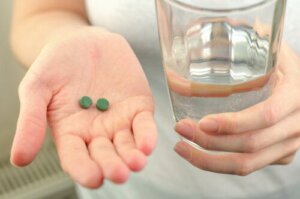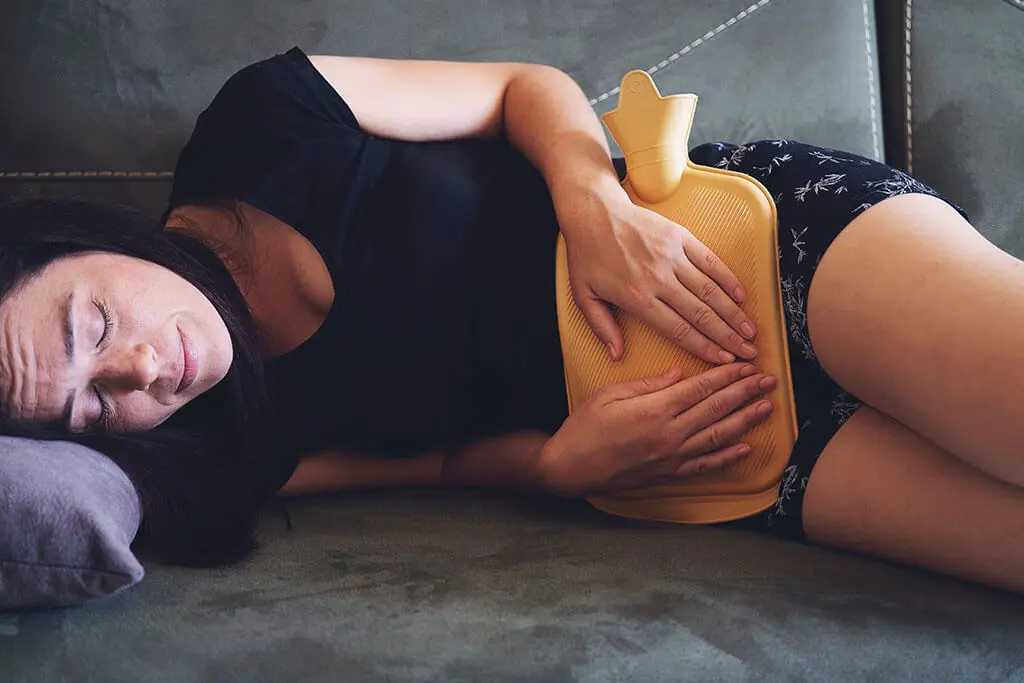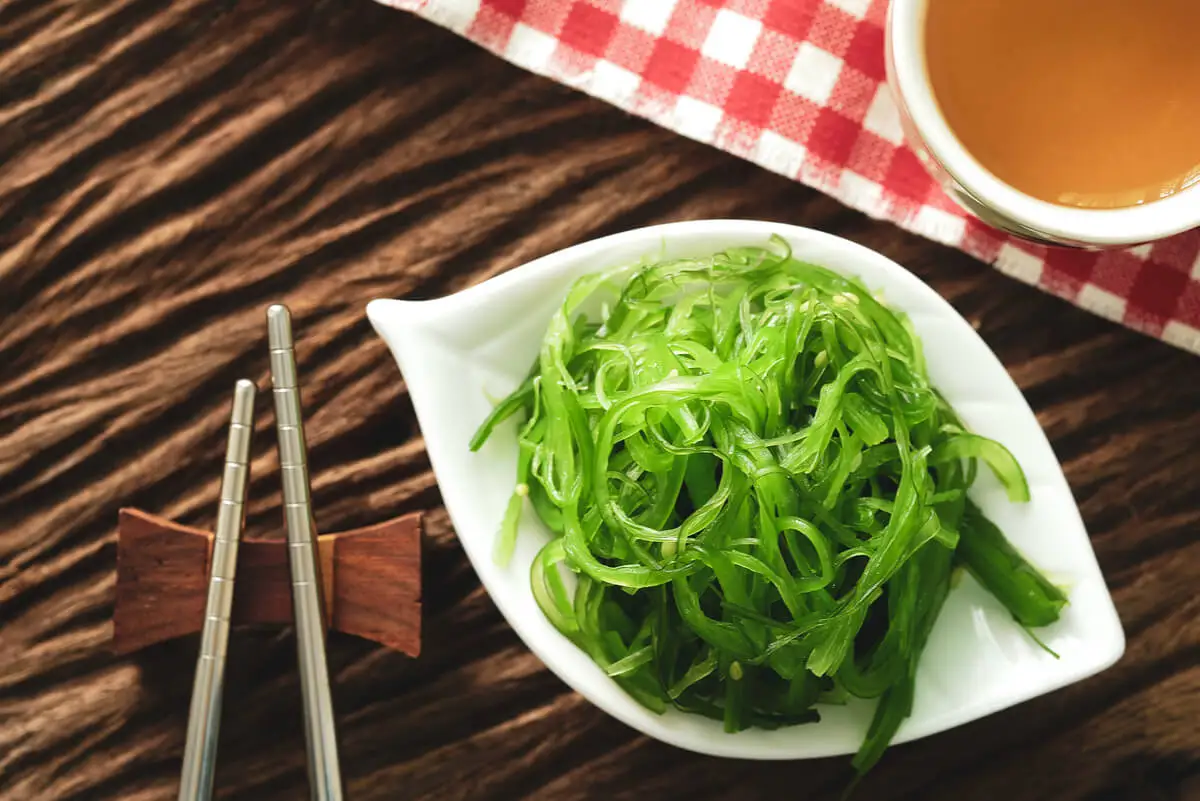Does Seaweed Help in the Treatment of Endometriosis?


Reviewed and approved by the pharmacist Franciele Rohor de Souza
The use of seaweed supplements (Fucus vesiculosus) has become popular for the treatment of endometriosis. According to its promoters, its anti-estrogenic activity acts positively against the symptoms of this disease.
In particular, it’s believed to promote hormonal balance, regulate the menstrual cycle, and reduce pain. However, for now, there aren’t enough clinical trials to support these properties, and it should be used with caution. Do you want to know more about it? Here are all the details.
What you should know about endometriosis
Endometriosis is a chronic gynecological disease characterized by the growth of endometrial tissue outside the uterus. Under normal conditions, the endometrium lines the inside of the uterus and, in the case of pregnancy, houses and nourishes the embryo.
If fertilization does not occur, the endometrium is shed and menstruation occurs. In the case of endometriosis, however, this tissue is usually located in the ovaries, fallopian tubes, urinary bladder, or intestines.
Although it also thickens, breaks down, and produces menstrual bleeding, it causes an inflammatory process that manifests itself through severe menstrual pain, dyspareunia (discomfort during sexual intercourse), excessive bleeding, abdominal swelling, and infertility, among other symptoms.
Pelvic pain is usually the reason for consulting a doctor. The professional confirms the diagnosis through complementary tests such as an ultrasound, magnetic resonance imaging, and a laparoscopy.
After this, treatment may include the following options:
- Medications, such as non-steroidal anti-inflammatory drugs (NSAIDs)
- Hormonal contraceptives
- Progestin therapy
- Gonadotropin-releasing hormone (GnRH) agonists and antagonists
- Aromatase inhibitors (to reduce estrogen levels)
- Laparoscopic surgery
- Fertility treatment
- Removal of the ovaries
- Lifestyle changes, such as improved diet and exercise
The choice of one therapeutic option or another depends on each particular case.
In addition, there are those who consider using some herbal supplements as adjuvants to reduce symptoms and improve quality of life. Seaweed supplements are among the most popular. But do they really work?

We think you may be interested in reading this, too: Oncological Blood Tests: What Are They and When Are They Done?
Properties of seaweed for the treatment of endometriosis
Endometriosis is an estrogen-dependent disease; in this regard, treatment with seaweed appears beneficial due to its anti-estrogenic qualities.
In particular, these supplements are associated with a decrease in the pain caused by this disease. They also appear to help regulate the menstrual cycle and decrease inflammation.
However, the evidence of its eficacy is still quite limited.
Research shared via BMC Complementary Medicine and Therapies found that administration of Fucus vesiculosus promotes relief of hypermenorrhea and dysmenorrhea. Therefore, it is associated with the feeling of relief in endometriosis.
However, its abundant phytonutrient content is also linked to its positive effects on this disease. As detailed in a study shared in the journal Marine Drugs, some of its main components are as follows:
- Carbohydrates (abundant in dietary fiber)
- Polyunsaturated lipids
- Proteins
- Vitamins
- Minerals
Another theory suggests that iodine intake plays a role in these effects. This and other minerals in seaweed help regulate the activity of the thyroid gland. Thus, they promote the balance of hormones in the blood.
A diet low in iodine has been linked to hormonal imbalance linked to endometriosis, uterine fibroids, and other reproductive health disorders.
Possible risks of seaweed treatment
Although seaweed supplements are linked to beneficial properties against endometriosis and other diseases, it should not be ignored that their intake carries certain risks. According to a study in Nutrition Reviews, some of their possible undesirable effects are as follows:
- Excessive intake of iodine: Although this trace element benefits the thyroid, in excess, it has the opposite effect. In this case, it’s associated with disorders such as goiters and thyroid cancer.
- Its abundant potassium intake may be detrimental to those with kidney disease.
- Due to its vitamin K content, it may interfere with the effect of anticoagulant drugs.
- Seaweed may contain heavy metals such as arsenic, cadmium, mercury, or lead.

How is seaweed consumed?
In some countries, such as Japan, seaweed is included in the regular diet as a vegetable. However, in other places, it’s more regularly consumed as a supplement, either in powder or tablet form.
It’s important to read the label and follow the manufacturer’s recommended dosage. In any case, before using this type of product, it’s best to consult your doctor.
Like this article? You may also like to read: Twinges and Pain in the Uterus: Causes and Medical Evidence
What to remember about seaweed and endometriosis
Although seaweed has become popular among those seeking complementary treatments for endometriosis, the truth is that there is insufficient evidence of its safety and efficacy.
It’s believed that its anti-estrogenic properties may help, but more studies are still needed. Therefore, this option should not be a first-choice treatment. The best alternative is to follow a specialist’s indications.
All cited sources were thoroughly reviewed by our team to ensure their quality, reliability, currency, and validity. The bibliography of this article was considered reliable and of academic or scientific accuracy.
- Tsamantioti ES, Mahdy H. Endometriosis. [Updated 2022 Feb 26]. In: StatPearls [Internet]. Treasure Island (FL): StatPearls Publishing; 2022 Jan-. Available from: https://www.ncbi.nlm.nih.gov/books/NBK567777/
- Catarino MD, Silva AMS, Cardoso SM. Phycochemical Constituents and Biological Activities of Fucus spp. Mar Drugs. 2018 Jul 27;16(8):249. doi: 10.3390/md16080249. PMID: 30060505; PMCID: PMC6117670.
- Bilal, M. Y., Dambaeva, S., Brownstein, D., Kwak-Kim, J., Gilman-Sachs, A., & Beaman, K. D. (2020). Iodide Transporters in the Endometrium: A Potential Diagnostic Marker for Women with Recurrent Pregnancy Failures. In Medical Principles and Practice (Vol. 29, Issue 5, pp. 412–421). S. Karger AG. https://doi.org/10.1159/000508309
This text is provided for informational purposes only and does not replace consultation with a professional. If in doubt, consult your specialist.








